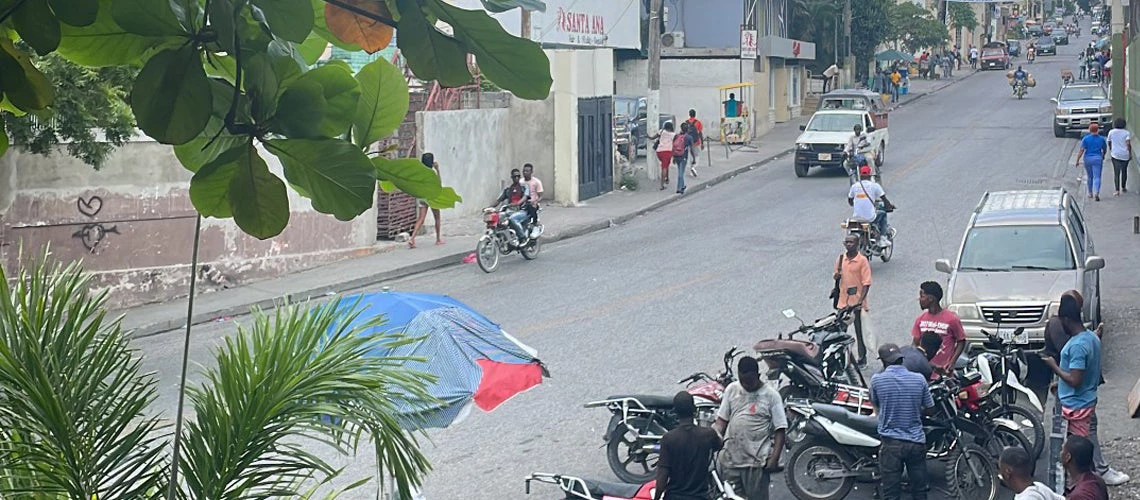 Haiti street scene
Haiti street scene
After struggling to recover from the shocks of the 2010 earthquake and Hurricane Matthew in 2016, Haiti’s economic development continues to be hampered by political instability, institutional fragility, and vulnerability to natural disasters. The departure of the United Nations Peacekeeping mission in 2017 and attempts to cut fuel subsidies triggered deep social unrest. The COVID-19 pandemic and the assassination of President Jovenel Moïse in July 2021 further exacerbated the situation. Since July 2018, Haiti has faced a period of extreme insecurity (Peyi Lok/Locked Country period), characterized by increased gang violence and kidnappings.
These converging crises have significantly impacted Haiti’s business. Foreign direct investment dropped from 2.5 percent of GDP in 2017 to 0.2 percent by 2020. The apparel sector, Haiti’s largest source of formal employment and exports, experienced a decline in global demand, supply chain disruptions, and factory closures stemming from the COVID-19 pandemic. Eighty-four percent of businesses reported political instability as their biggest obstacle to operate.
Despite these deteriorating conditions, the International Development Association’s Private Sector Window (IDA PSW) has continued to support Haiti’s private sector.
IDA PSW was launched in 2017 to catalyze private sector investment in the most challenging IDA-eligible countries, with a focus on fragile and conflict-affected situations (FCS). IDA PSW blends concessional funds with private sector investment by the International Finance Corporation (IFC) or the Multilateral Investment Guarantee Agency (MIGA) to help mitigate specific investment risks for high-impact development projects.
In Haiti, support from IDA PSW enabled IFC to provide long-term financing for projects in the financial services and beverages industries. In addition, as part of IFC’s COVID-19 response, IDA PSW supported trade in the agriculture sector through IFC’s flagship Global Trade Finance Program.
IFC-financed investments such as Ayiti Leasing and Caribbean Bottling Company (CBC) demonstrate the important role that IDA PSW can play in creating the right conditions for private sector investment.
- Ayiti Leasing, Haiti’s first leasing company for small- and medium-enterprises (SMEs), is helping credit-constrained SMEs access the machinery, vehicles, and other equipment they need to operate. Leasing is an effective financing solution for Haitian SMEs because it allows them to expand their access to medium- and long-term financing without having to provide collateral or a credit history. IDA PSW co-invested a concessional loan with IFC’s investment in Ayiti Leasing in 2019—critical for enabling viable financing terms for SMEs. While the declining political and security environment prompted Ayiti Leasing to cancel part of the financing it had planned with IFC, the company nonetheless increased its SME leasing portfolio by 164 percent by the end of the project.
- In the beverages sector, IDA PSW and IFC invested in local beverage bottling company CBC to increase their bottling lines, warehousing, and distribution capacity to expand sales and increase distribution of safe drinking water for customers. Small businesses like CBC often struggle to access affordable, long-term financing. The structure of IDA PSW’s concessional loan improved the project’s risk profile, allowing CBC to secure long-term financing needed to scale up its business. Based on IFC estimates, CBC has also created approximately 400 direct, indirect, and induced jobs for the Haitian population.
Lessons from IFC’s experience in Haiti
The use of blended concessional finance from IDA PSW has been critical to address the high risks associated with private sector investments in Haiti, especially during the current political and security crisis. At the same time, it is important to recognize that blended concessional finance from IDA PSW or other facilities is only one component of a larger toolkit needed to support the private sector in countries facing fragility and conflict. This includes World Bank efforts to further strengthen the enabling environment, working under a “One World Bank” approach, as well as upstream initiatives from IFC to build a pipeline of investment opportunities, and advisory services to help companies improve their performance. An example of this was the support provided prior to the Ayiti Leasing project to establish a regulatory framework and enabling environment for leasing. CBC benefited from advisory services to strengthen the company’s capacity related to food safety.
While the current political and security situation in Haiti creates a challenging context for private sector investment, the experience of IDA PSW shows it is possible for IFC and the World Bank to remain engaged. These factors are critical in FCS contexts, where bankable investment opportunities are scarce and private sector capacity may be limited. With tools like IDA PSW, we can help keep Haiti open for business.



Join the Conversation